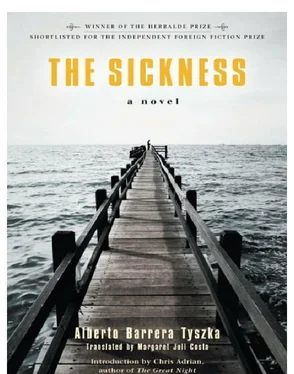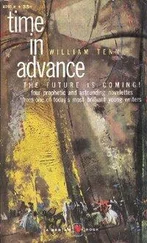“Dr. Miranda!”
She hears it a second time and feels the same shiver run through her. The voice comes from behind, from behind and from the left, from above too. Behind, above, and to the left. Karina feels those two words crowd into her head. She had gone with Dr. Miranda to help him carry some samples and, there they are, walking back to the office, strolling serenely down the corridor, when that voice appears, a voice that is like a bolt of lightning to Karina, but to which Dr. Miranda appears oblivious.
“I think someone’s calling you,” Karina says at last, placing one hand on Dr. Miranda’s arm.
And then they both turn round. They do so quite naturally and slowly, although Karina experiences this quite differently, more quickly and more tensely. She’s quite right: Ernesto is coming toward them. He looks so unchanged, so normal, that, for a second, Karina feels slightly disappointed. He doesn’t even look thinner or paler, there’s nothing to show that he has just been through a health crisis or a time of terrible suffering. Not that he’s exactly in festive mood either, he approaches wearing a tentative smile and looking quite calm, timid but quite calm.
“Could I speak to you for a moment?” he asks, and his voice is neither cold nor hot, but he looks straight into Dr. Miranda’s eyes.
“The fact is. .”
“It will only take a minute. Please.”
Karina is beside herself with nerves. She doesn’t dare look at either for them for very long. She lowers her eyes and lets her gaze wander from her shoes to Dr. Miranda’s shoes, elegant in brown leather, and from there to Ernesto Durán’s shoes, also leather, but older and cheaper, and black, with no laces and with rather pointed toes.
Only when she feels the doctor’s hand on her shoulder does she realize that she has drifted off, escaped from the moment. She looks up, and when she becomes aware of Durán’s eyes on her, she immediately feels a wave of heat inside her. She hopes she doesn’t blush. She hopes she doesn’t do anything. She tries to appear as normal as possible.
“Can you go on ahead and give these results to Dr. Sananes?”
She says she will, of course, naturally, she nods, takes the pieces of paper, again says, yes, of course, drops the papers, again says yes, while all three of them bend down to pick up the wretched results. She feels closer to the shoes now. And it seems to her absurd to think such a thing. It bothers her, irritates her. Almost as much as it does to find herself in this ridiculous situation. As she moves off, her pulse is ahead of her, beating much faster than she can walk. When she turns a corner in the corridor, she stops to catch her breath, to try and calm herself, to think. She peers round the corner and watches the two men in the distance. Ernesto Durán is wearing blue pants and a white cotton shirt. He’s the one doing the talking. He is making small gestures with his hands. What on earth can he be saying? Karina senses that it will all end in disaster. The idea that everything will finally be revealed, the fear of being discovered, weighs on her far more than knowing that Ernesto Durán is alive and well. What will happen now?
In Chekhov’s story “Ward 6,” the doctor says to the patient: “There is neither morality nor logic in my being a doctor and your being a mental patient, there is nothing more to it than idle chance.” Perhaps Karina is thinking something not dissimilar as she watches them. Perhaps she even believes that she is the “idle chance” that has brought these two men together as doctor and patient. Shouldn’t she go over and explain everything to them right now? Shouldn’t she go and tell them that she alone is the hinge that allows them to look at each other and share in the same movement? But Karina is paralyzed, frozen. She cannot even breathe very deeply. She stands there, stunned, watching Durán and Miranda. This only lasts a moment though.
What’s going on? As soon as they’re alone, Ernesto Durán makes a brief gesture in the air as if he were giving a turn to an invisible screw. He attempts a smile too.
“Thank you,” he says.
And then he looks at the doctor and gives him a knowing nod. Andrés Miranda just stares at him, perplexed, still waiting.
“It’s been a long time, eh?” Durán adds, after a pause.
Andrés is growing more bewildered by the minute. Durán finds this attitude rather intimidating. Or so it would seem. He was apparently expecting something else, some other reaction. He had probably imagined this meeting quite differently.
“If you say so.”
Ernesto Durán nods more energetically this time, like someone obliged to get to the point and to stop beating about the bush. He clears his throat, then looks straight into Andrés’s eyes:
“The illness, doctor,” he says gravely. “It’s killing me.”
Andrés feels that something inside him is deflating. He suddenly has no idea what he’s doing here with this man he doesn’t know. There must be some mistake, some terrible mistake, this morning, in the middle of a hospital corridor, some ghastly error, some absurd misunderstanding. Andrés looks behind him, looks around, instinctively repeating the gestures of someone who feels he has been mistaken for someone else.
“I’m serious. .”
Serious? He’s serious. The illness is killing him. For a moment, Andrés considers brushing him off with a curt response, for example: “Well, it’s the same for us all, isn’t it?” Yes, he could say something like that, then just turn and leave. He could also slap him on the back and cheer him up a little: “Don’t be so solemn about it, it’s not so bad. That’s why we live, in order to get ill.” He would accompany him a little way down the corridor and then escape to his office. Another possibility would be to talk to him about his father. To show him the latest test results. To say to this stranger what he finds so hard to say to his own father. To tell him that he’s terrified. That he doesn’t know how to get through the next moment. That he can’t imagine himself alone, so alone, when Javier Miranda is no longer Javier Miranda, when he no longer exists. The illness is killing us.
“I’m sorry,” he says at last, trying to control his voice as he speaks. “I think there’s been some mistake. I don’t know why you’re telling me this.”
The man then moves his head twice from side to side, as if he had water in his ears.
“Don’t you recognize me, Andrés?” he asks suddenly, looking at him hard and addressing him by his first name.
“No, I’m sorry, but I don’t think we’ve even met.”
“I’m Ernesto Durán.”
Andrés Miranda moistens his lips with his tongue. For a few seconds, he seems to be thinking hard. Ernesto follows with his eyes that imaginary journey, that invisible search.
“I’m sorry,” Andrés says again after a pause.
Then he makes a gesture intended to bring the conversation to a close.
“Wait.” Ernesto stops him. He squeezes his arm hard. “The letters.”
“What letters?” Andrés asks in bewilderment.
“The e-mails we’ve written to each other.”
“I’m sorry, but now I know you’re mistaken.”
“But. .”
“I don’t use e-mail. I don’t think I’ve ever replied to an e-mail in my life. You’re mistaking me for someone else. If you look in the directory, you’ll see that there’s a gastroenterologist who has a surname similar to mine, perhaps that’s what happened.”
And before Ernesto can say or do anything else, Andrés has walked off, hurriedly, without turning around, without even saying goodbye, as if the meeting had been a slip, a blunder, to be dismissed with cordial excuses, in the middle of a hospital corridor.
When Mariana sees the three drops of blood on the floor, she realizes the moment has come. She’s known for days now that this is a symptom that could appear at any time. It’s not a symptom but the symptom, the one they’ve all been expecting. She immediately regrets that it should have happened on a Wednesday, at four in the afternoon, when her father-in-law has come to spend a few hours with his grandchildren in their apartment. Andrés has gone out. Relations between them grow sourer every day; he’s permanently in the blackest of moods, which Mariana can understand, but she simply can’t bear it anymore. She, too, wishes it would just end once and for all.
Читать дальше












